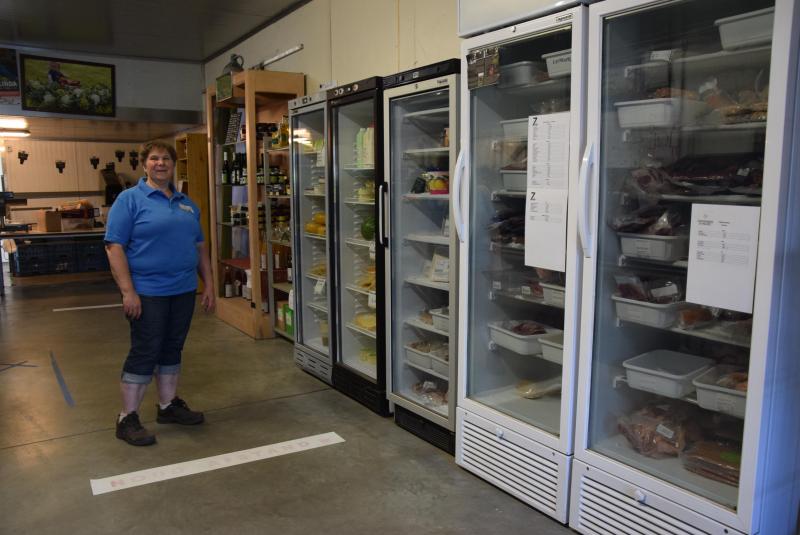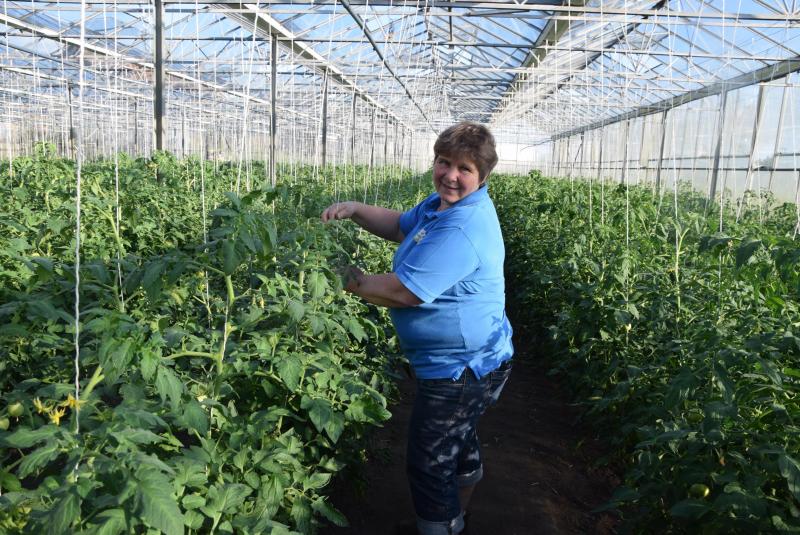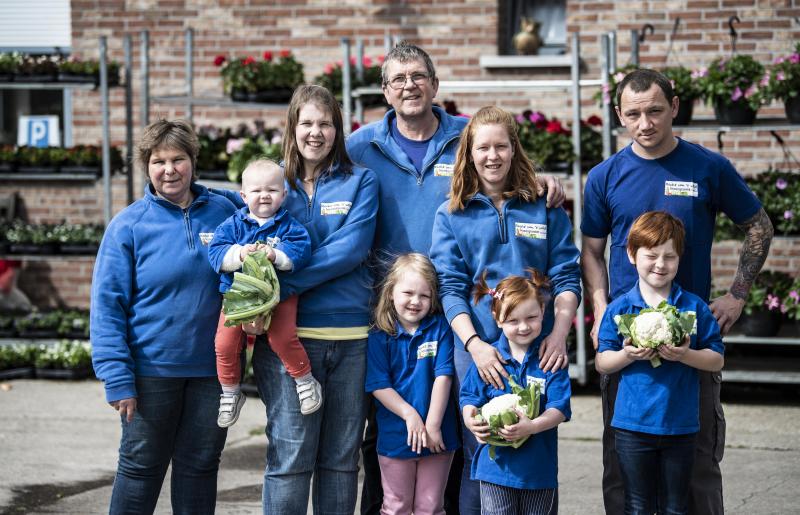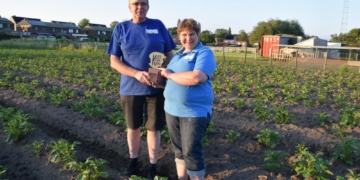People are increasingly finding their vegetables, fruit and even processed products on the shelves of farm shops. That is also the case with Linda Van Dessel and her husband Raf Storms. They run the farm with farm shop Recht van ‘t Veld. “Or as we sometimes call it: from the land to the customer!” With almost one third of the votes Linda was elected the Short Chain Cup 2021.
Also this year, the Flemish provinces, the Flemish government, the Short Chain Support Center and the Flemish Center for Agro- and Fisheries Marketing (VLAM) organized the Week of the Short Chain in May. The aim of the campaign is to raise awareness about purchasing products directly from farmers and horticulturists. With success, because the population finds their way to the farmer more and more easily. The number of farm producers in the province of Antwerp increases every year. In total there are about 167 farm producers.

Just like last year, a figurehead was also elected in 2021. The verdict came on May 14. This year Linda Van Dessel became Korte Keten Kop 2021 for the province of Antwerp. Together with her husband Raf Storms, she runs the horticultural company with farm shop Recht van ‘t Veld in Duffel, which the couple founded 8 years ago.
“Traditional agriculture is also welcome”
Of the 3,631 votes, Linda was able to put 1,153 behind her name. “We had already talked about registering, and in a crazy moment we did so. We received a nice trophy, and it will of course have its place in the farm shop. The promotion for our farm shop is also great,” she adds enthusiastically.
But the most important thing, she thinks, is that the general population gets back in touch with the agricultural sector. “With our participation, we want to demonstrate that in addition to organic farming, traditional farming is also allowed and can have a farm shop,” adds her husband Raf. “Our method can also be called almost organic: we only use a little fertilizer, and we spray as little as possible. Only the potatoes need one treatment against weeds.”
Expand farm
The history of the horticultural business goes back to 1984, when the couple tied the knot. The horticultural company was founded in 1985. “We were really a typical Mechelen horticultural company, with 4 main crops: chrysanthemums, leeks, early cauliflowers and open field tomatoes in the greenhouse. We took over the company from Linda’s father”, says Raf. “In the beginning we cultivated about 2 ha, but that eventually grew to a cultivation area of 11 ha.
A serious expansion that became a bit too much for us. We therefore stopped growing tomatoes in the greenhouse, partly because tomato cultivation on substrate emerged and the market took over. However, I was so fond of open ground tomato cultivation that we started it again a few years later.”
The couple currently grows a whole range of crops, both outdoors and in the greenhouse. Outside are potato, sweet potato, cauliflower, white and red cabbage and the chrysanthemums for which they have been known for so long. “My father started it and we just continued it. He started with traditional chrysanthemums that are of such good quality that we even have customers who have come back every year for the last 40 years!”, Linda says proudly.
In the greenhouse we find all kinds of tomato varieties, but also cucumbers, aubergines, bell peppers and peppers. On the field are kale, beans, Brussels sprouts, pumpkin, beetroot and courgettes. “In the beginning we also tried some more special vegetables, such as peas, but we stopped doing that,” says Linda. “They started the farm shop a little later. “On 1 July this year we will have our farm shop for 8 years. And it also started small and grew steadily.”
Corona boosted farm shop
Initially, the horticultural couple only sold what they grew themselves, but that gradually changed. The range on the store shelves was expanded at the request of the customer. “If you want to make spaghetti sauce, you won’t get there with onions and tomatoes, so we also provided a very diverse set of vegetables.”
During the corona pandemic, the store also received a huge boost. The greengrocer in the village closed and the market was no longer allowed. The locals searched so places where they could still buy food. And that was the case at Recht van ‘t Veld, among others: they offered dairy, meat, vegetables and fruit. Only bread could not be found on the shelves.
“Suddenly we got a lot of people over the floor! At times the line outside was very long,” recalls Raf. At that time, the proximity of our children was very welcome. “We have had a lot of help from our children, because they belonged in our bubble. We have also hired additional workers. We decided to adjust the opening hours. Normally we are open from 2 pm, but then we could open at 9 or 10 am”, Linda adds her husband.
The potatoes and onions were the most sought after during corona. “We really had to make sure that people didn’t hoard in the beginning. Fortunately, we were able to supply our store with extra potatoes and onions, thanks to other farmers. By the way, all our suppliers have worked very hard to be able to replenish,” said Linda. “We also had to watch closely that people touched so few things, so we served them with 3 people to be able to work corona-proof.”
Hoevewinkel connects farmers
The couple is proud that they have tried and know everything in the farm shop themselves. “First of all, we don’t just sell our own and our family’s products, we also talk to every farmer who supplied us with products and tasted them as well. Only when we know the story behind the product, how it was produced and what it tastes like, can we decide whether we stand behind it and sell it,” says Linda. “In order to provide consumers with a diverse range, we also purchase from the BelOrta auction. We prefer Belgian products, but it is possible that some products are of Dutch origin. Our customers still understand that. We avoid countries other than the Netherlands, because that is already less understood.”

If we look at the shelves, at first sight all Flemish producers seem to come together in the store. “I have to be careful that we don’t forget anyone because we work with quite a few people,” she laughs. The list is indeed long. ‘t Zwarthof supplies the store with pork, beef and lamb. In addition to lamb and sheep products, such as farm ice cream made from milk, the Wollekes also supply chicken meat. There is also farm ice in the freezer of the Schuttershoeve. De Meirhoeve provides cheese, De Kriekelaarhoeve provides dairy products. Fruit company Gomand and fruit company Wens provide apples, which they also use to make juice.
Gert Vets is still taking care of the summer fruit. Fresh blueberries come from the blueberry growers Schrijnwerkers. “If we make pies with blueberries, can you be sure that they have been sold immediately!” says Lnda enthusiastically. The range is completed with products that you would not expect from a farmer: tomato paste from Tompuur, pastes and pressed oils from Migino, rapeseed products from Hof ter Vrijlegem and honey from various vegetable crops and fruit blossoms, such as leek, rapeseed, cherry… from Torflinghof. “Very special, especially the honey from leek seeds. It’s the most running of all,” she says. certainly the honey from leek seeds. It’s the most running of all,” she says. certainly the honey from leek seeds. It’s the most running of all,” she says.
Standing strong with family
Linda and Raf are clearly not alone. Her family lives close to each other all over the street. “My mother had died just before I won the Short Chain Cup 2021. That was an emotional week, but luckily I wasn’t alone with the children by our side,” she adds. Her brothers Louis and Robert and her sister Maria also live down the street and each has its own business with its own specializations. “We each grow something different, so we can offer our customers a varied and fresh range.” The gardener’s microbe has also spread among the children. “Greta, my brother’s daughter, grows cauliflower, green and white celery. So that is also on our shelves.”
Linda and Raf’s children, Sanne and Nicky, also have their job in the company: they do everything that has to do with computer work and the media. For example, interested parties can reach Recht van ‘t Veld via their Facebook and their site. For example, the vegetable package will be online every week. “I prepare the packages. My daughters make sure it gets online. I didn’t eat much of those online things,” she laughs.
Almost a neighbor?
The store sells products from so many fellow farmers and horticulturists. And then it turns out that the sales of Recht van ‘t Veld also went through neighboring farms in and around Antwerp for a while. Recht van ‘t Veld was part of the Roma neighboring farms, but also those in Merksem, Deurne, Wommelgem and Lier. “Our best years were at our first neighboring farm, on the Roma in Antwerp. That was a real baptism of fire for us.
We also got to know many fellow farmers and horticulturists who now also sell through our store,” says Linda. In the end, the couple ended the collaboration. “It was time consuming to get everything ready and we could no longer combine it with our own store and activities. In addition, we had to hand over 20% of the price of the product to the neighbor, which we thought was a lot.

The store currently accounts for 80% of revenue. Only 20% is sold through the auction. “In the beginning it was the other way around”, Raf admits. Last year, the couple didn’t even sell anything at the auction. “In the spring we hadn’t had time to cover our cauliflower due to corona and we had to deal with cabbage fly. Well, then that’s it,” says Raf. “With all due respect to the auctions – we need them – but there all products from all producers are put together and sold. There the grower as an individual has disappeared. When we sell through the store, we see the respect of the customers for our product. That’s the great thing about our job: we bring it food from the land to the customer.”































